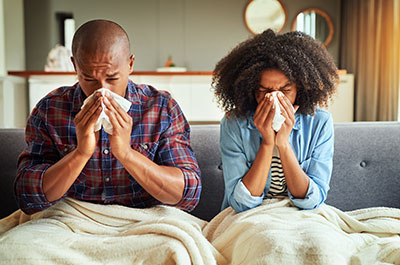With winter shifting into high gear and colds, flu and other viruses lurking seemingly everywhere, many people wonder how they can tell if they’re still contagious after falling ill.
“It’s especially important to take precautions if you’ve tested positive for COVID-19, flu (influenza) or respiratory syncytial virus (RSV),” says Alexis Federman, D.O., a primary care physician at Henry Ford Health. “Any one of these infections can be fatal for very young children, the elderly and people who are immune compromised.”
How do you know what you have and if you’re still contagious? And what precautions should you take to protect yourself and others during cold and flu season? Here, Dr. Federman answers your most pressing questions about common infections.
How do illnesses typically spread?

Get Your Flu Shot
It depends on the illness. Some sicknesses happen to anyone who comes in close contact with an infected person. Others are more likely to occur among certain subgroups, including those who are very young, very old or immune compromised due to another health condition.
In general, viruses—including cold, flu and COVID-19—are spread through airborne droplets from the cough or sneeze of an infected person. Many viruses can live for days to weeks on surfaces, such as laptops, countertops and doorknobs. Touch a contaminated surface before touching your face, and you can transmit the virus.
How do you know what virus you have?
That’s a great question. There’s a lot of overlap between COVID-19 symptoms and influenza and RSV, so based on symptoms alone, it can be difficult to tell which bug you’re battling—or whether you’re just suffering from allergies, reflux or medication side effects.
If you’re feeling sick, the best thing you can do is get tested for flu and COVID-19. Once you know what you have, you’ll be better equipped to make decisions about when it’s safe to return to your usual activities and planned gatherings.
How can you tell if you’re contagious after an infection?
With many viruses, you may be contagious even before you start experiencing symptoms. Tests can determine whether you have certain viruses, but with the exception of COVID-19, they usually aren’t meant to let you know you’ve cleared an infection.
Many people continue to have symptoms when they’re no longer infectious. Coughs and sore throats, for example, can linger for weeks or even months after symptoms begin. A few guidelines:
- Cold and flu: Most people are contagious with the cold or flu beginning a day or two before symptoms set in. The worst fever and aches happen during the first 3 to 5 days, which is when infection risk is highest. The flu tends to linger, so it’s best to isolate for 5 to 7 days. With both cold and flu, coughing and fatigue can last 2 weeks or more.
- COVID-19: If you have mild to moderate COVID-19, Centers for Disease Control and Prevention (CDC) guidelines recommend isolating for at least 10 days. If symptoms are improving, and you’ve had two negative coronavirus tests 48 hours apart, you no longer need to isolate. With severe COVID-19, you could remain infectious for up to 20 days.
- Pneumonia: Pneumonia can be caused by bacteria, viruses or fungi. Bacterial pneumonia is usually contagious as long as you have a fever, and for up to 48 hours after starting treatment with antibiotics. Viral pneumonia is contagious for as long as you’re experiencing symptoms, especially fever. Fungal pneumonia is not contagious.
- RSV: RSV is the most common cause of hospital admissions for children under 1 year of age. Both adults and children infected with RSV are typically infectious for 1 to 2 days before showing symptoms and 3 to 8 days after symptoms begin. Unfortunately, a subset of infants and adults with weakened immune systems can continue spreading the virus for up to 4 weeks after symptoms resolve.
- Strep throat: Strep throat is a bacterial illness that is very contagious, especially in close quarters, such as daycares, schools and military barracks. Antibiotics can reduce infectivity within 24 to 48 hours. Left untreated, strep remains contagious for 2 to 3 weeks.
What precautions should you take if you’re sick?
It’s unrealistic and even impossible for people to stay home during the entire period when they could be infectious. This is especially true for illnesses that can be infectious long after symptoms resolve. At the very least, you should remain home for at least 24 hours after your fever breaks and while you have active symptoms. When you do return to school or work, consider wearing a mask to avoid infecting others.
Most importantly, take the following precautions to reduce your risk of spreading—and contracting—infections:
- Wash your hands.
- Eat a wholesome diet, including plenty of fruits, vegetables and whole grains.
- Get sufficient sleep.
- Exercise regularly.
- Steer clear of people who are sick and stay home if you don't feel well.
- Get vaccinated for COVID-19 and flu. And if you’re over age 60 or pregnant, consider getting the newly approved RSV vaccine. Young babies can also get antibody treatment meant to protect against RSV.
Reviewed by Dr. Alexis Federman, an internal medicine specialist who sees patients at Henry Ford Medical Center - Livonia.


